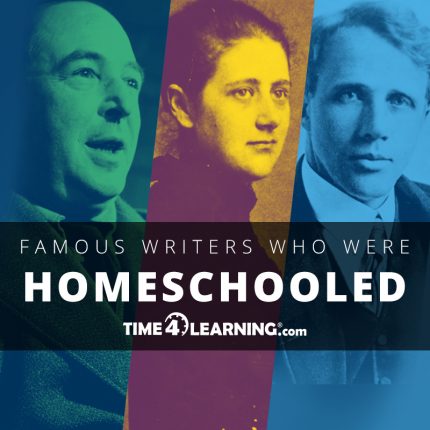
Famous Writers Who Were Homeschooled
September 24, 2018Sponsored post from Time4Learning.com.
This quote from Robert Frost’s poem “The Road Not Taken” could be viewed as a brief summation of his educational experience:
“Two roads diverged in a wood, and
I took the one less traveled by,
And that has made all the difference.”
The educational road most traveled is through traditional schooling in a classroom. For personal reasons, Frost’s family decided the road less traveled by, the homeschooling route, would best suit his disposition as a young boy. It is a road many other parents also choose for their children. Maybe it’s because homeschooling provides the flexibility and freedom to create their own curriculum and their own schedule. Perhaps you have different reasons for choosing this road.
An Inspiring Education
Whatever the reason, one thing is certain, homeschooling offers an educational experience that nurtures the imagination and spurs great creativity. It most certainly did for many great writers who have entertained and inspired us with their tales, poems, novels, and short stories. These writers include:
Louisa May Alcott: Alcott wrote the novel Little Women, which is still read today. She studied with Henry David Thoreau, Ralph Waldo Emerson and Theodore Parker. She first started writing under various pseudonyms.
Hans Christian Andersen: Andersen was born in Denmark. He wrote children stories, the most famous being The Ugly Duckling, The Little Mermaid and The Princess and the Pea.
Margaret Atwood: Atwood was born in Canada. She is a poet, novelist, literary critic, essayist, inventor, and environmental activist. She wrote The Handmaid’s Tale, Cat’s Eye, The Blind Assassin, and many more books.
Jane Austen: Austen is known for combining romance and realism in her books. She wrote Pride and Prejudice and Sense and Sensibility, which are considered literary classics. She published them anonymously.
Robert Browning: Browning wrote during the Victorian period. He was a poet and playwright. His two most famous works are The Pied Piper of Hamelin, a children’s poem and The Ring and the Book, a 12-book long poem. He was married to the poet Elizabeth Barrett Browning.
William F. Buckley Jr: Buckley was a conservative author and commentator. He founded the National Review magazine in 1955, and hosted 1,429 episodes of the television show Firing Line.
Robert Burns: Burns was born in Scotland. He was a poet and lyricist. He is widely regarded as the national poet of Scotland and is celebrated worldwide. He is most famous for the New Year’s Eve celebratory lyrics of Auld Lang Syne.
Willa Cather: Cather is a writer most noted for her novels of frontier life on the Great Plains. They include O Pioneers!, The Song of the Lark, and My Ántonia. In 1923 she was awarded the Pulitzer Prize for One of Ours.
Agatha Christie: Christie wrote 66 detective novels and brought to life the famous Hercule Poirot, perhaps the greatest detective in the world, and Miss Marple, known for her “shrewd intelligence.” She is the best-selling novelist of all time.
Samuel Clemens (Mark Twain): Twain wrote the classic novels The Adventures of Tom Sawyer and Adventures of Huckleberry Finn.’ He may be most famous for his quotes such as “Kindness is the language which the deaf can hear and the blind can see.”
Charles Dickens: Dickens is a British author, who penned such celebrated books as Oliver Twist, A Christmas Carol, David Copperfield and Great Expectations.
Robert Frost: Frost won four Pulitzer Prizes and was a special guest at President John F. Kennedy’s inauguration. He became the unofficial “poet laureate” and was a national celebratory. His famous poems include The Road Not Taken, Mending Wall, and Stopping by Woods On a Snowy Evening.
Alex Haley: Haley wrote the is best known for the book and miniseries Roots and The Autobiography of Malcolm X. His works portrayed generations of African-American lives.
C.S. Lewis: Lewis is most known for The Chronicles of Narnia fantasy series, which have been adapted into several films. In 2005, The Lion, The Witch and the Wardrobe opened at movie theaters.
Amy Lowell: Lowell was a poet of the imagist school. She won the Pulitzer Prize for Poetry in 1926 after her death. She was a major advocate of “free verse” poetry.
Thomas Paine: Paine was one of the Founding Fathers. He was a political activist, philosopher, political theorist, and revolutionary. He wrote the two most significant pamphlets at the start of the American Revolution, the most famous being Common Sense.
Beatrix Potter: Potter was a writer, illustrator, natural scientist, and conservationist. Her most famous work is The Tale of Peter Rabbit. She once said: Thank goodness I was never sent to school; it would have rubbed off some of the originality.
Carl Sandberg: Sandberg was a poet, writer, and editor. He won three Pulitzer Prizes — two for his poetry and one for his biography of Abraham Lincoln. He was “a major figure in contemporary literature.” His works include Chicago Poems, Cornhuskers, and Smoke and Steel.
Mary Shelley: Shelley’s most famous work is her horror novel, Frankenstein, which she wrote when she was 20 years old. It also became a famous movie. She was married to poet Percy Bysshe Shelley.
J.R.R. Tolkien: Tolkien was a fantasy writer best known for his works The Hobbit and The Lord of the Rings trilogy, which both have been turned into massive movie hits.
Leo Tolstoy: Tolstoy was a Russian writer best known for some of the greatest literary works such as War and Peace and Anna Karenina.
Walt Whitman: One of the great American poets, Whitman self-published the collection Leaves of Grass. It is now a milestone in American literature, and he is credited with inventing a whole new poetic form. He was also a journalist and editor and was mostly self-taught since he was 11 years old.
Virginia Woolf: Woolf was raised by “free-thinking” parents and later in life wrote modernist novels such as Mrs. Dalloway, To the Lighthouse, and Orlando, and also groundbreaking feminist works, A Room of One’s Own and Three Guineas.
The Road Not Taken
Now that you have embarked on the road less traveled upon, take advantage of all the wonderful educational tools and opportunities that are available. For example, you can use a flexible, online curriculum that can be tailored to your child’s individual needs. All you need is a computer or tablet and internet connection. Your children will excel at their own pace, making it ideal for all kinds of learners, whether they are mainstream, gifted or special needs. Or you can select a mix of curriculum options. You have the freedom, and the opportunities and choices are nearly endless. As Frost said, your decision to homeschool could be the thing “that has made all the difference.”
Latest Posts

Guest Post by Gabriel Morse For several years, I sat for long hours every day behind one of those battleship gray desks in a windowless, dull, gray office. The pay was enough to take care…
Read more >
This post is sponsored by Little Monsters Universe. I'm Tina Salmanowitz, an advocate for homeschooling and science education. With over a decade of experience as a science educator (in class…
Read more >
This post is sponsored by Time4Learning. Before the pandemic, it was business as usual for Boca Raton resident Nikki Warris. Her two daughters, 5-year-old Natalie and 8-year-old Lexi were…
Read more >

